While such was the condition of affairs, Lord Buckhurst landed at Flushing—four months after the departure of Leicester—on the 24th March, having been tossing three days and nights at sea in a great storm, “miserably sick and in great danger of drowning.” Sir William Russell, governor of Flushing, informed him of the progress making by Prince Maurice in virtue of his new authority. He told him that the Zeeland regiment, vacant by Sidney’s death, and which the Queen wished bestowed upon Russell himself, had been given to Count Solms; a circumstance which was very sure to exite her Majesty’s ire; but that the greater number, and those of the better sort; disliked the alteration of government, and relied entirely upon the Queen. Sainte Aldegonde visited him at Middelburgh, and in a “long discourse” expressed the most friendly sentiments towards England, with free offers of personal service. “Nevertheless,” said Buckhurst, cautiously, “I mean to trust the effect, not his words, and so I hope he will not much deceive me. His opinion is that the Earl of Leicester’s absence hath chiefly caused this change, and that without his return it will hardly be restored again, but that upon his arrival all these clouds will prove but a summershower.”
As a matter of course the new ambassador lifted up his voice, immediately after setting foot on shore, in favour of the starving soldiers of his Queen. “’Tis a most lamentable thing,” said he, “to hear the complaints of soldiers and captains for want of pay.” . . . . Whole companies made their way into his presence, literally crying aloud for bread. “For Jesus’ sake,” wrote Buckhurst, “hasten to send relief with all speed, and let such victuallers be appointed as have a conscience not to make themselves rich with the famine of poor soldiers. If her Majesty send not money, and that with speed, for their payment, I am afraid to think what mischief and miseries are like to follow.”
Then the ambassador proceeded to the Hague, holding interviews with influential personages in private, and with the States-General in public. Such was the charm of his manner, and so firm the conviction of sincerity and good-will which he inspired, that in the course of a fortnight there was already a sensible change in the aspect of affairs. The enemy, who, at the time of their arrival, had been making bonfires and holding triumphal processions for joy of the great breach between Holland and England, and had been “hoping to swallow them all up, while there were so few left who knew how to act,” were already manifesting disappointment.




